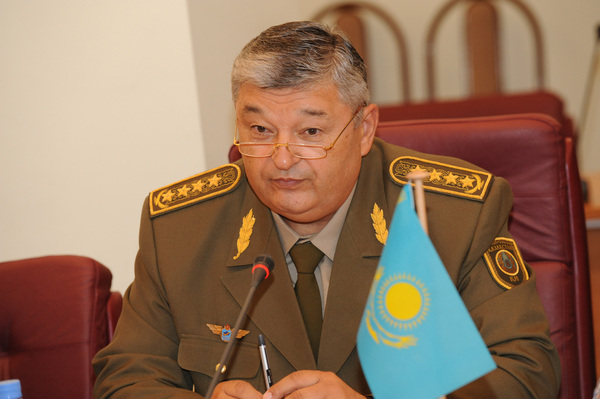
Kazakhstan Faces Long Term Border Security Reform
Publication: Eurasia Daily Monitor Volume: 9 Issue: 128
By:

Following the unprecedented mass killings at the Arkan Kergen border post in eastern Kazakhstan, the main suspect, Vladislav Chelakh, was sent to Almaty on June 28 to undergo psychiatric checks. Chelakh is accused of murdering 14 border guard colleagues on May 30, 2012. Yet, the incident, which initially prompted speculation that the killings were an act of terrorism close to the Sino-Kazakhstani border, has proved to be a watershed in the evolution of Kazakhstan’s border security apparatus (Interfax, June 28).
On June 14, the former Defense Minister and Senator, Army-General (retired) Mukhtar Altynbayev, ascribed the tragic incident to “violations of service regulations” – an alternative way of referring to dedovshchina (the hazing of newer recruits by older soldiers or officers). Although the investigation remains ongoing, Altynbayev was emphatic that the underlying issue in the killings was linked to brutal hazing within the unit. Moreover, the senator commented on the resignation of the head of the National Security Committee (KNB) Border Guard Service, Major-General Nurzhan Myrsaliyev, saying that “if he has tendered his resignation, that means he is guilty of something” (Interfax, June 14).
To further underscore Altynbayev’s critique of the May 30 border post tragedy, on June 18, eleven conscripts deserted from the Tersayryk border post in Ust-Kamensk. Twenty four hours later, the missing border guards were located 18 kilometers from base. Following their debriefing, criminal cases were opened against three contract personnel, including the commander of the unit, who were accused of beating up their colleagues (Interfax, June 26, 19, 18).
Apart from these incidents occurring at border posts close to Kazakhstan’s eastern border with China, it appears that the underlying issues leading to mass murder and border guards deserting their posts were breaches of service regulations, or more clearly dedovshchina and ill-discipline. However, the border guards found absent without official leave (AWOL) were all conscripts, allegedly being systematically beaten by contract personnel (kontraktniki). What disturbed the senior leadership of the KNB Border Guard Service along with the political leadership in Astana was that the kontraktniki seemed to be the instigators of the hazing (Interfax, June 26, 24).
According to Maulen Ashimbayev, a deputy of the Majlis (lower house parliament), these events have prompted the drafting of new legislation on border security. Majlis deputies are being sent to border posts in order to familiarize themselves with the nature of the problems and challenges facing the entire service. Analysis of the issues uncovered in the border service will form part of the process of drafting the new bill, which is expected to be signed into law before the end of the year (Interfax, June 20).
Astana has therefore reacted quickly to the high-profile border security events, and will now move to implement a range of measures including fresh changes to the legislative basis for the KNB Border Service, as well as other measures designed to boost the image of the body. Furthermore, since the border service is subordinated to the National Security Committee, it is a politically sensitive issue to address any possible damage to the reputation of the domestic intelligence agency. Other political factors are also evident, most notably stemming from the sensitive proximity of these border incidents to China. Astana attaches importance to its strategic partnership with China, and it also promotes security cooperation with China through the Shanghai Cooperation Organization (SCO); there are consequently a range of factors forcing the Kazakhstani authorities to act decisively (Interfax, June 20).
Andrei Grozin, the head of the Moscow-based Central Asia and Kazakhstan section at the Institute of CIS Countries, noted that Central Asia, year-on-year, is increasingly serving as a transit territory for narcotics from Afghanistan. Although his assertion contained essentially nothing new – the transit routes and the impact on Central Asia have long been known – Grozin portrayed a general booming of this trade ahead of the NATO withdrawal from Afghanistan in 2014. Grozin highlighted the sheer scale of border security problems in the region:
“First, for the narcotics barons it is much more convenient and simpler to reach an agreement with Central Asian border guards and with Central Asian representatives of regional authorities. In addition to this, it is understandable that if one transports narcotics through Iran – which is partially being done – there is much more risk. This is because Iran is conducting the fight against the narcotics mafia very harshly, and the legislation regarding narcotics traffickers and people linked to the narcotics mafia is very harsh in Iran, comparable with China in terms of harshness; i.e., the death penalty is very widely used there, let’s put it like this. In this sense, legislation in Central Asian republics is much more liberal” (Rossiya 24, June 3).
Grozin’s analysis contains important clues as to why Central Asia’s border guard agencies are so severely overstretched and are targeted by anyone seeking to smuggle illicit goods, including narcotics or weapons. He correctly identified levels of institutional corruption among the regional border services as a factor that limits the capacity of the Central Asian states to meet these challenges. However, Grozin pointed to the narcotics business in Central Asia, which acts as a source of “constant mild chaos,” not in any sense serving to stabilize the security situation in the region (Rossiya 24, June 3).
Although Kazakhstan’s 2011 Military Doctrine recognizes the seriousness of border security and promises to take steps to further strengthen existing structures, it also places this in the context of benefitting the Customs Union (Belarus, Kazakhstan and Russia) (www.mod.kz, October 11, 2011). Thus, a number of general driving factors are serving to influence Kazakhstan’s security thinking on border protection, and the latest commitment to enact new legislation may indicate that greater attention will be paid to this area of national security policy. The law was already likely to be drafted, as a natural follow-on from the 2011 Military Doctrine; the process will now be adjusted to reflect recent events. Nonetheless, in order to ensure real improvements, Kazakhstani policymakers will first need to understand what was wrong with the pre-reform KNB Border Service and address the deeper issues stemming from manpower in relation to training, career development and reducing corruption.




